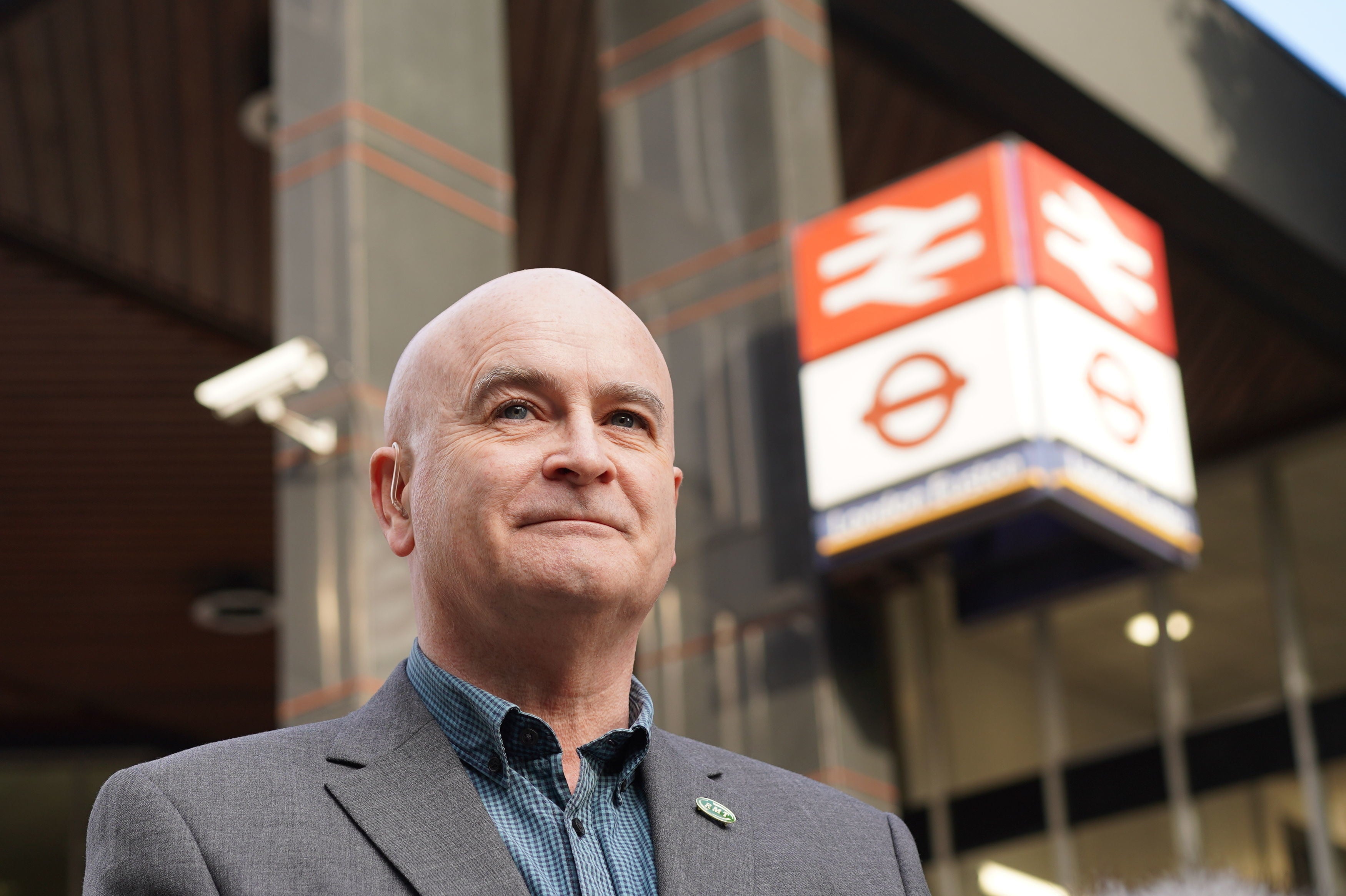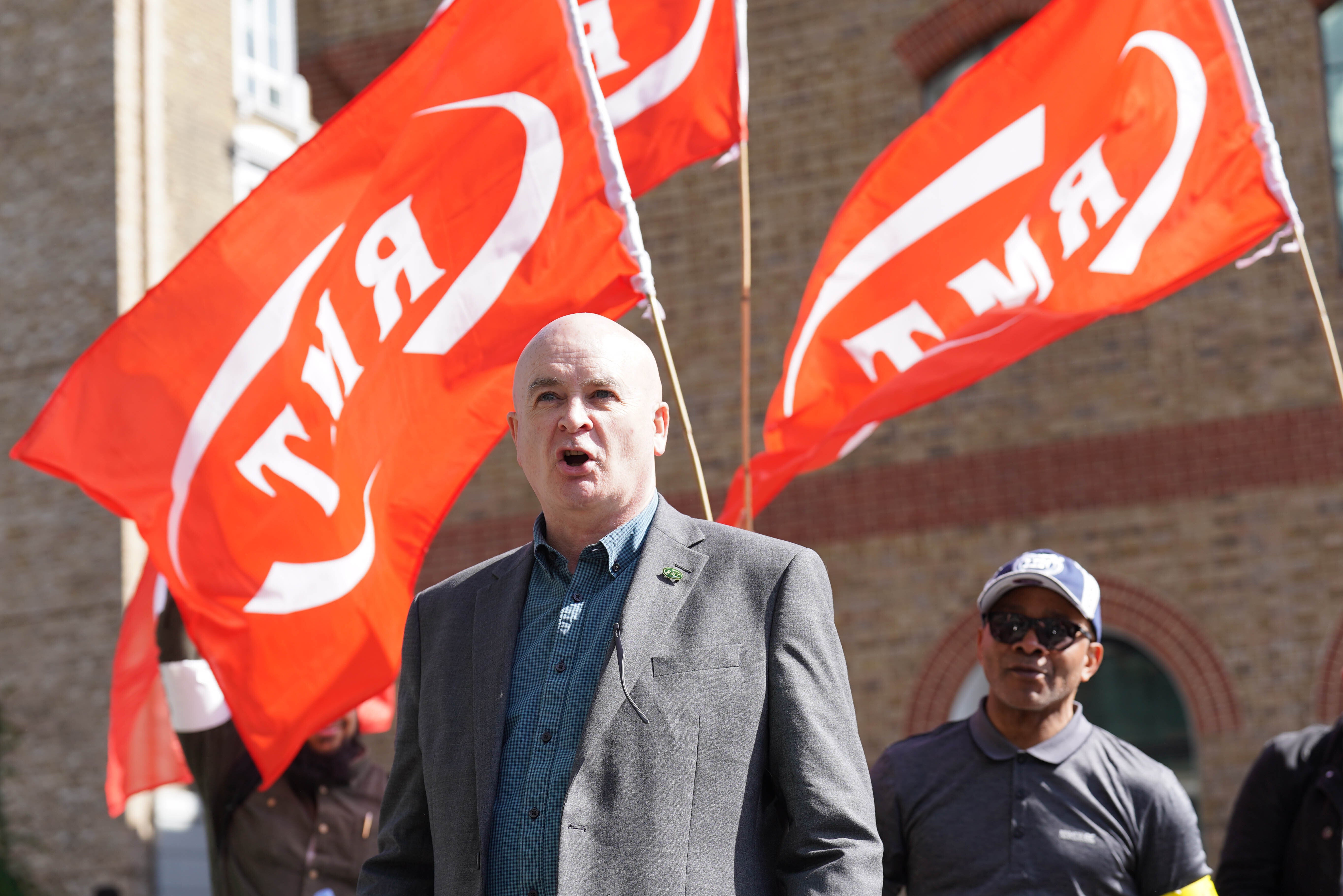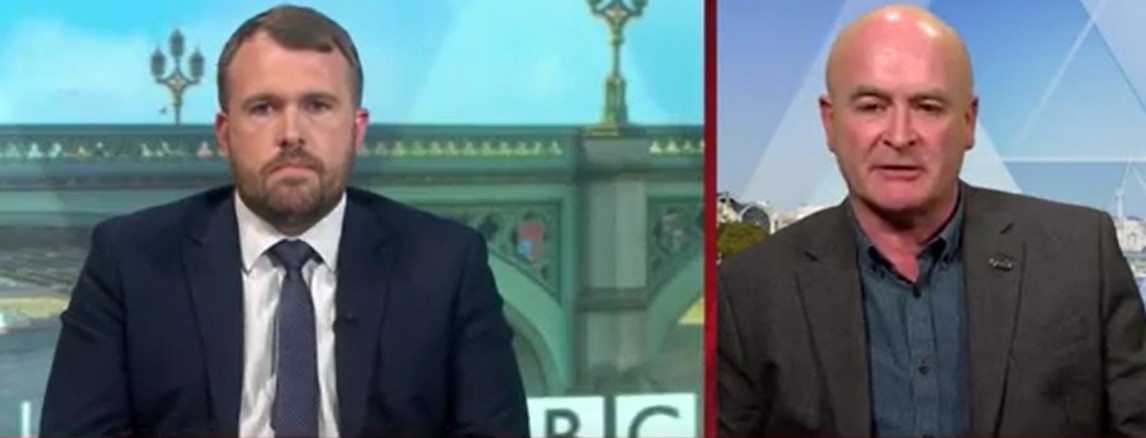Mick Lynch: The trade union leader who is nobody’s puppet
The general secretary of the RMT union has been taking on, and vanquishing, all comers – politicians and journalists alike. Now he has become a thorn in Boris Johnson’s side, writes Sean O’Grady


There’s no doubt who is the media sensation of the week. It’s Mick Lynch, general secretary of the National Union of Rail, Maritime and Transport Workers (RMT).
It makes a change from one of the Kardashians. Like a sort of working-class superhero in a fight scene, he’s taken on all comers in TV and radio studios. Armed only with facts, first-hand knowledge of the talks he’s actually been in and a deep understanding of the rail industry, Lynch left smart-arse interviewers with fancy degrees slack-jawed and Tory MPs trussed up by their own ignorance. Robert Jenrick tried to pull a fast one on inflationary dangers and – wham! – Mick flattened him with the RPI the rail companies used to ramp up commuter fares (but do not apply to wage rises).
The hapless Jonathan Gullis tried to deploy our brave veterans in his struggle, but Lynch countered with the observation that he was simply a backbencher reading a central office script and unworthy of his attention. Junior minister Chris Philp trotted out the oft-repeated line that Lynch refuses to talk to Tory ministers, only to be firmly corrected and told that Lynch had in fact held conversations with most of the transport department ministers, including the secretary of state, Grant Shapps (“when he wanted something out of me to keep the railways running during Covid”). Lynch looked Philp in the eye and called him a liar. Philp smirked and squirmed like a naughty schoolboy.
In her early-doors interview on Sky News, Kay Burley made a transparent attempt to get the equable Lynch to justify mob violence on the picket line, amply rebutted by him stepping to one side to allow the camera to drink in the listless bunch standing behind him, their placards at half mast: “You can see what picketing involves.” I’ve seen retired Lib Dem canvassers in Devon more pumped up than that lot.
Rounding things off, Robert Peston – usually as up for it as an Arsenal striker on cup final day – gave up trying to defeat Lynch in open combat and just let him get on with mauling Jenrick. Tellingly, Shapps, who can’t help but seem lightweight by comparison, never ever goes head-to-head with Lynch.
“Surreal” is an overused word, but when Piers Morgan decided to whack Lynch on Talk TV it was Morgan who got humiliated in the strangest few minutes of current affairs TV in a long while. Obviously sensing a scoop and a weak spot in Lynch’s formidable defensive armoury, Morgan seized on the fact that Lynch uses a picture of the Thunderbirds villain The Hood on his Facebook page. With a vignette of the diminutive half-remembered children’s television baddie comically nestling between the two down-the-line gladiators, Morgan launched his assault as if he was at the controls of Thunderbird 1:
Morgan (indignant): “Why don’t you just confirm or deny if this is your Facebook page. It’s a picture of The Hood from Thunderbirds.”
Lynch (a flicker of a smile): “Yes, it’s me. Can you see the likeness?”
Morgan (grimly serious): “Well I’m just wondering where the comparison goes because he was obviously an evil, criminal terrorist mastermind, described as the world’s most dangerous man, who wrecked utter carnage and havoc on the public.”
Lynch (indulgent and bemused): “He’s the most evil puppet made out of vinyl in the world. Is that the level journalism’s at these days?”
And so it went on. Lynch and his pals had thought it’d be amusing to feature The Hood on the Facebook page and Morgan fastened on to it as a sign of egomania, funnily enough. It was surely done with a certain commendable sense of self-deprecatory humour, which belies the notion that Lynch is a communist monster in the mould of Joseph Stalin, Lavrentiy Beria or Nicolae Ceauçescu, none of them famed for taking the mick out of themselves (if you’ll pardon the pun).

That said, Lynch does have the same “power bald” hairstyle favoured by The Hood, the same spare, minimalist, sartorial style (but not the big black eyebrows), a calm demeanour, a similar sense of meticulous attention to detail – the rail strikes are smartly designed to maximise disruption for minimal loss of pay – and the same determination to win.
He has been at, or near, the top of the British trade union movement for some years, and anyone familiar with it will know its propensity for vicious factional warfare, often taking place far from the gaze of an uninterested public. Unions have merged and merged as their memberships have shrunk and their power diminished – the RMT itself is a product of the old National Union of Railwaymen and the National Union of Seamen. Unions can still be playgrounds for Trotskyists and their internal politics a nasty contrast with their public devotion to the brotherhood of man.
Lynch has had his ups and downs in the RMT before being elected general secretary and installed in May last year. His predecessor, Mick Cash, announced in October 2020 that he was standing down, citing a campaign of bullying and abuse within the union that he said made it impossible for him to continue and had made him poorly. Lynch too had previously stood down as assistant general secretary, levelling similar accusations about the “toxic” atmosphere at the top of the RMT.
Things seem to have settled down now and, after the last few days, Lynch’s position must be judged unassailable. He’s been elected for a five-year term, until 2026 (no more jobs for life). Asked by The Guardian soon after he was elected whether some people were still awkward, he said: “Some of them [on the RMT national executive]. The others have changed their ways.”
It’s a fair approximation of the truth to say that Lynch is, essentially, a protege of the late Bob Crow, who died too young in 2014. Crow took the “Millwall” attitude to industrial disputes – “no one likes us, we don’t care”. He was the most successful trade unionist of his generation by far, and secured substantial pay rises and better conditions for his members, particularly on the London Underground.

Crow, like Lynch, may or may not have been a “Marxist”, whatever that means, but they were and are both wary of the Labour right, to the extent that the RMT is now disaffiliated from the Labour Party. This hasn’t exactly been an embarrassment for Keir Starmer. Lynch is quite simply one of the leftists of the kind we knew well in the Labour Party of the 1970s and 1980s, followers of Michael Foot, Tony Benn and, indeed, Jeremy Corbyn. They, like Lynch, also distrusted the EU as a bosses club and an obstacle to democracy and building a socialist society. The truth is that, politically, Lynch isn’t as “moderate” or reasonable as he sounds.
It’s tempting to wonder if Boris Johnson has at last met his match in Mick Lynch. Like Ted Heath found as premier in the 1970s, a majority in parliament is of little use to you in a time of high inflation, union militancy and that much-maligned phrase “working-class solidarity”. For now at least Lynch has got the public on his side, despite the disruption, because so many people fear the effects of spiralling bills on the welfare of their familiars.
To many people faced with a £1,000 hike in their energy bills, Lynch is talking perfect sense, and they might rather like to be in a union led by someone such as him. Like the beleaguered Heath, a civilised, well-educated, man half a century ago, albeit from lower-middle-class origins, Johnson is now being outsmarted by a bunch of trade unionists who’d never get the chance to set foot in Balliol College, Oxford. Johnson, one suspects, will “loco reverse” on pay just as readily as Heath did, and for the same reasons – he hasn’t got a workable strategy, the public don’t like him and he’s weak.
And Lynch is certainly from a working-class background. As the name suggests, he’s the son of Irish immigrants who made do with rented accommodation without running hot water, used a tin bathtub and shared an outside loo in the back yard with the neighbours. I can attest that such slum conditions weren’t so very rare in Britain in the Swinging Sixties. Lynch left school at 16 and learned a trade as an electrician, but found himself blacklisted because of his union activities. He wound up working for Eurostar by about the age of 30, in 1993, and got involved once again in the union. He’s paid a salary of £84,000, about the same as a backbench MP, and, as Bob Crow once quipped about his own successes, he might feel that he’s “worth it”. At any rate, Lynch knows he’s going to have his character assassinated by the Tory press in the same manner as any of his predecessors, going right back to the likes of Sid Weighell and Ray Buckton, whose “Aslef hordes” (thank you, Private Eye) struck fear into the commuters of middle England.
Times have changed. Mark Solomons, former industrial correspondent of The Sun, who has thus seen it all, rates Lynch highly among the greats of the movement. Writing in The Spectator, he offers this:
“Mick Lynch is not a normal union leader in that he is, well, normal. It’s as if he has taken the best bits of previous examples of the job and moulded them into a finished article – the working-classness of Ron Todd, the temperament of Bill Jordan, the passion of Rodney Bickerstaffe and the wit and wisdom of another rail union leader, Jimmy Knapp, one of the nicest I ever dealt with.”
The downside of it, illustrated there, is that Lynch tends to get patronised a bit for being “authentic”, like he’s something you’d find on a stall at an artisan food market. In what you might term the centrist media, he’s been patted on the head – as if someone of his background being able to get the better of some dolt of a Tory MP makes Lynch into a supernatural being. He’s just good at his job, and they’re not very good at theirs.
Last thought: though he’d never admit it, Lynch and the RMT have also been greatly assisted by what they’d call “vicious Tory anti-union laws”. But the vicious laws passed under Margaret Thatcher, John Major and David Cameron actually meant that the RMT’s strikes were democratically approved by a majority of the membership (and not just those who voted), that he himself enjoys a proper mandate from the individual members in a secret independent ballot, that the RMT’s finances are transparent and that, even if they wanted to, unions can’t actually run the kind of flying and mass pickets unions used to until the miners’ strike collapsed in 1985, with the intimidation and violence that followed. It’s against the law and unnecessary (Kay Burley please note). Mrs Thatcher and Norman Tebbitt effectively helped unions and strikes become legitimate – or at least harder to slag off. OK, controversial view.
Perhaps we should conclude with the praise the Morning Star gave Lynch this week: “Lynch has rewritten the trade union communications manual by the simple expedient of telling it straight, knowing his facts in detail and presenting them with compelling force and good humour.
“He also handed down a lesson to communicators of a Marxist disposition to keep it simple, tell it straight and stay on-message to the millions of working people whose real-life experiences make them question the way Britain is run and are looking for answers to the questions which this fast-developing crisis of capitalism presents.”
Whether of a Marxist disposition or not – or a Hood look-a-like or not – it would seem that Mick Lynch is nobody’s puppet. More everybody’s poppet, really.
Join our commenting forum
Join thought-provoking conversations, follow other Independent readers and see their replies
Comments
Bookmark popover
Removed from bookmarks